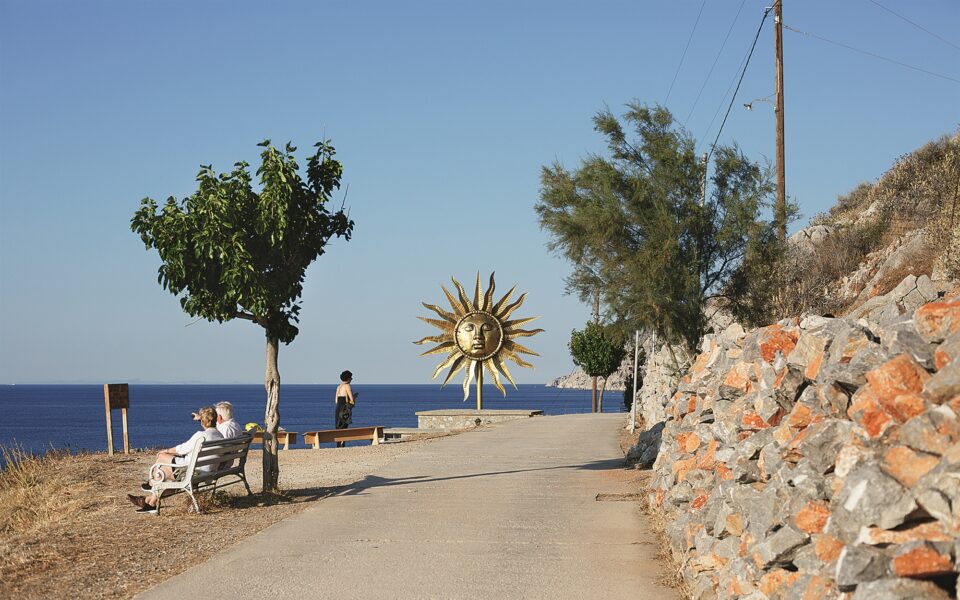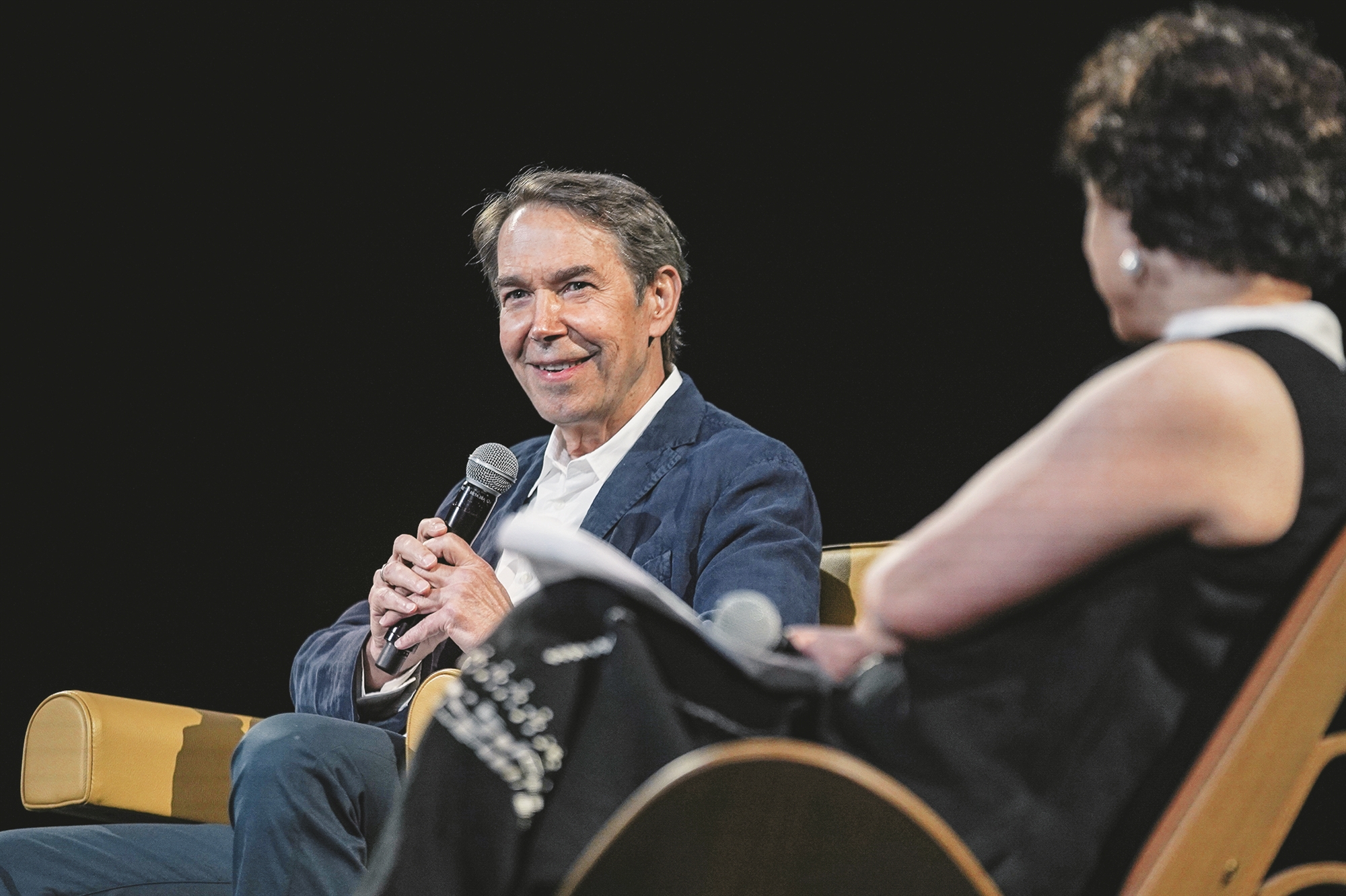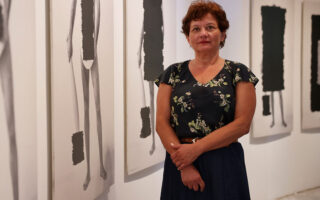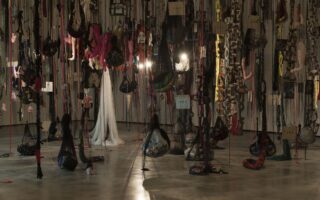Behind the ‘Greek’ Art for Tomorrow
How the international conference and the acclaimed Jeff Koons came to Athens this year

Jeff Koons, the most expensive artist in the world right now, was sitting in the audience at the opening of his “Lost in America” retrospective in Doha when the president of the Art for Tomorrow conference, Achilles Tsaltas, took the microphone and asked: “Will you come a find yourself in Greece?” “Why not?” answered the American artist. Just a few months later he was on stage at the Onassis Stegi cultural center in the Greek capital speaking at the conference. Seven years after being established by the New York Times, the event made its Greek debut last month.
Tsaltas’ Greek-Australian background played an important role in this development. “The Greek DNA runs in my blood from my parents, from all the way in distant Australia where I grew up. My heart throbs every time I hear the word ‘Greece’ and I always ask myself what I can bring to the country,” Tsaltas, formerly vice president of international conferences for the New York Times, tells Kathimerini.
Art for Tomorrow is an initiative that stems from the Athens Democracy Forum, which has taken place annually in the Greek capital since 2011. It inspired the Democracy & Culture Foundation, of which Tsaltas is president, which was created in 2019 in agreement with the NYT. The foundation, in turn, took the Athens Democracy Forum under its wing, as well as the Art for Tomorrow conference, giving rise to the idea of holding the event in Athens as well.
The second reason why the conference/festival was held in Athens has to do with the city itself and the boom of its art scene in recent years. “The theme of Art for Tomorrow is a really good fit with what’s happening in Greece today, because it is not just about investing in and collecting art, but about the social impact of art and culture, about viewing art as a catalyst for social and economic development,” says Tsaltas.
There has been a lot of talk for some years now as to whether Athens is the new Berlin, or even the new Bilbao, which became a major art destination with the opening of the Guggenheim Museum in 1997, prompting the so-called “Bilbao Effect.” Is there, in fact, an “Athens Effect”? The question was at the core of this year’s Art for Tomorrow – and was actually the title of a panel discussion at the Greek National Gallery coordinated by NYT culture writer Roslyn Sulcas.
“Of course there is an ‘Athens Effect.’ Just like the pressure of a press in yielding more olive oil, so the crisis brought a surge of creativity that marries Athens’ ancient legacy with something very modern, be it street art or something like the ‘Plasmata’ exhibition at the Pedion tou Areos Park,” says Tsaltas.
The “Athens Effect,” that ‘marriage’ of different elements, is precisely what has made Greece an alternative to Paris, London or New York. “People are getting a bit tired of something so conventional. We are all looking for something authentic, and if Athens isn’t full of surprises, I don’t know who is,” he adds.
‘We are all looking for something authentic, and if Athens isn’t full of surprises, I don’t know who is’
One of the things the conference sought to establish as an experience – regardless of whether the event takes place somewhere else next year – is the “culture walk.”
“Athens’ greatest assets are not just the National Museum of Contemporary Art, the Onassis Foundation or the National Gallery – amazing as they are – or the myriad lovely galleries that have opened across the city. It is also the walk around Monastiraki or Exarchia, in the middle of the graffiti and street art, to end up at the Kalidromiou Street farmers market – and that’s culture too,” explains Tsaltas.
The key component to translate the Athenian “moment” into a lasting reality is respect, says Tsaltas. “Respect for the past, but also curiosity about the future,” he says, referring to the notion of creating a new legacy. “It will take work and, above all, a spirit of cooperation, which is something we Greeks do not have in abundance. It takes a leap of faith to help each other in building something that will last.”
The third reason why the conference came to Athens has to do with Jeff Koons. The artist and the respected Greek Cypriot collector Dakis Joannou had spoken at previous installments of Art for Tomorrow, but this year, Joannou is hosting a show by Koons – his friend of 36 years – at the DESTE Foundation Project Space Slaughterhouse on the island of Hydra. When the artist agreed to speak at the conference in Athens, Tsaltas decided to hold it after the end of the Art Basel fair in Switzerland and before the Hydra opening.
Pointing to a photograph with Joannou taken in Hydra in 1986, Koons tells Kathimerini that he chose the small island in the Saronic Gulf for this new project because he wanted to celebrate freedom.
“Freedom as a concept, and the freedom that I now have as an artist to do what I want,” he says, adding that “the foundation of the culture of Hydra is based on the pursuit of freedom.”
For Tsaltas, there is a related concept that links the two conferences organized by the Democracy & Culture Foundation: Democracy.
“Culture can exist without democracy, but democracy cannot exist without culture,” he tells Kathimerini.
He also believes that Greece has a lot to offer in both areas. “It’s got that something,” he says. “It’s all about connecting the dots and going back to basics and being authentic – and intuitively, people can feel that in Greece, and that’s the ‘Athens Effect.’”
Jeff Koons’ solo exhibition “Apollo,” at the DESTE Foundation Project Space at Hydra’s Slaughterhouse, will be on show until October 31.







